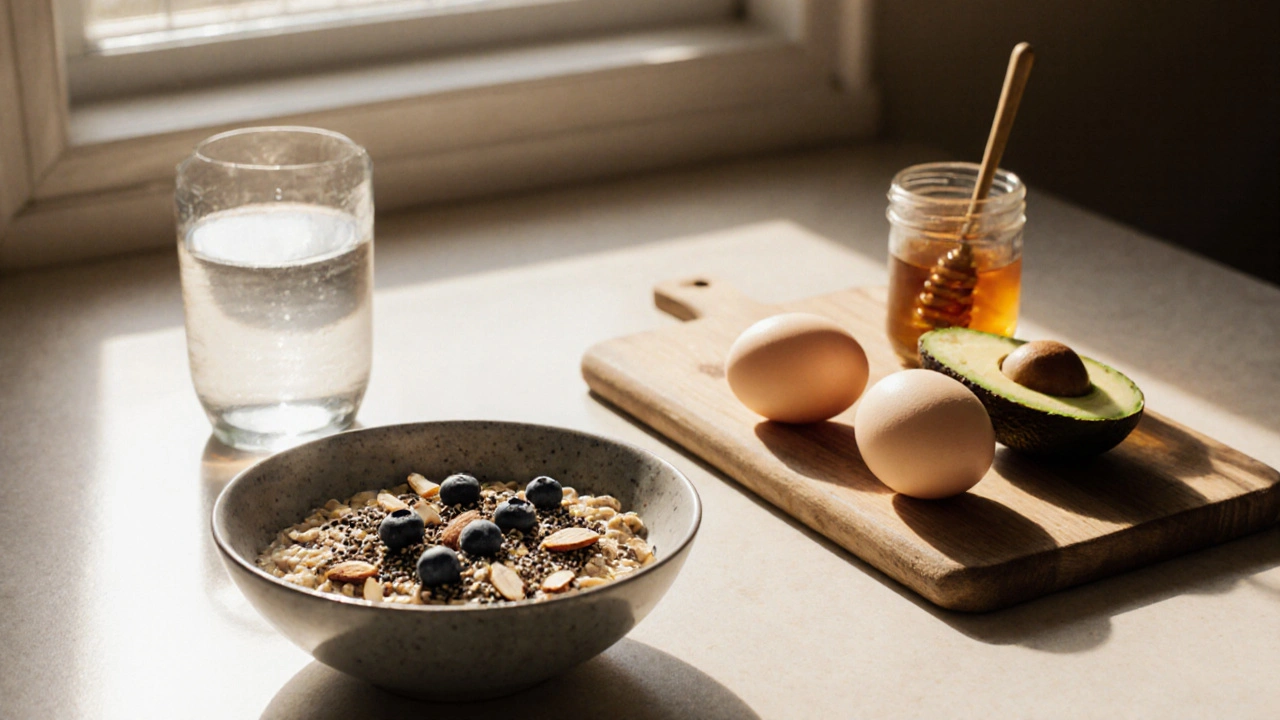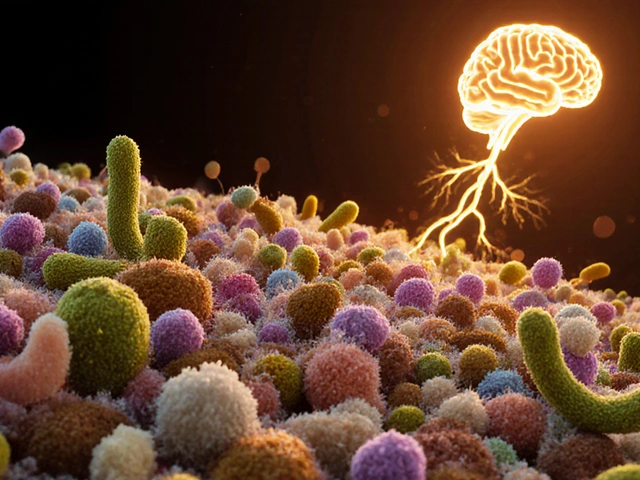
Healthy Breakfast Score Calculator
How Your Breakfast Scores
We'll calculate your breakfast based on three key factors:
1. Protein (15-25g)
2. Fiber
3. Healthy Fats
Your Breakfast Score
Suggestions to Improve
What you eat in the morning doesn’t just fill your stomach-it shapes your whole day. But not all breakfasts are created equal. The idea that breakfast is the most important meal of the day isn’t just an old saying. It’s backed by decades of research in nutrition, metabolism, and brain function. So what actually makes a breakfast healthy? And why does skipping it sometimes backfire-even if you’re trying to lose weight?
Why Your Body Needs Breakfast After Fasting
When you wake up, your body has been fasting for 8 to 12 hours. Your liver glycogen stores-the main source of glucose your brain uses-are nearly empty. Without food, your body starts breaking down muscle tissue to make glucose. That’s not ideal if you want to stay strong and sharp.
Studies from the American Journal of Clinical Nutrition show that people who eat breakfast regularly have more stable blood sugar levels throughout the day. This means fewer energy crashes, less sugar cravings, and better control over hunger hormones like ghrelin and leptin. One 2023 meta-analysis of over 40,000 adults found that breakfast eaters were 15% less likely to overeat later in the day compared to those who skipped it.
It’s not about forcing yourself to eat if you’re not hungry. It’s about giving your body the right fuel when it needs it most. A simple bowl of oatmeal with berries and a boiled egg can signal to your body that food is coming, so it doesn’t go into survival mode.
What Makes a Breakfast Actually Healthy?
Not every meal with cereal or toast counts as healthy. A bowl of sugary cereal with whole milk might fill you up, but it spikes your blood sugar and leaves you hungry again by 10 a.m. Healthy breakfasts share three key traits: they’re high in protein, fiber, and healthy fats.
Protein slows digestion, keeps you full longer, and supports muscle repair. Eggs, Greek yogurt, cottage cheese, tofu, and lean meats like turkey bacon all deliver 15-25 grams of protein per serving. Fiber, found in whole grains, fruits, vegetables, nuts, and seeds, helps regulate blood sugar and feeds your gut bacteria. Healthy fats-like those in avocado, nuts, seeds, and olive oil-support brain function and hormone balance.
Here’s what a real healthy breakfast looks like:
- Steel-cut oats topped with chia seeds, sliced almonds, and blueberries
- Two boiled eggs with sautéed spinach and half an avocado
- Plain Greek yogurt with flaxseed, a drizzle of honey, and sliced pear
- Whole grain toast with peanut butter and banana slices
These meals don’t require fancy ingredients. They’re simple, affordable, and take less than 10 minutes to prepare. The key is avoiding added sugars and refined carbs. Look at the ingredient list: if sugar is listed among the first three items, it’s not a healthy breakfast, no matter how much marketing calls it "natural" or "energy-boosting."
Breakfast and Metabolism: The Truth About "Jumpstarting" Your Day
There’s a myth that eating breakfast "jumpstarts" your metabolism. The truth? Your metabolism doesn’t suddenly speed up because you ate in the morning. But what does change is how your body uses energy.
Research from the University of Alabama shows that people who eat breakfast have better insulin sensitivity throughout the day. That means your body handles carbohydrates more efficiently, stores less fat, and burns more calories during activity. In one study, participants who ate breakfast burned 15-20% more calories during moderate exercise compared to those who skipped it-even when total calorie intake was the same.
It’s not magic. It’s biology. When you eat protein and fiber early, your body releases a hormone called GLP-1, which helps regulate appetite and glucose metabolism. This effect lasts for hours. Skipping breakfast doesn’t save calories-it just delays your body’s ability to use them effectively.

What Happens When You Skip Breakfast
Some people skip breakfast to cut calories or try intermittent fasting. But for many, it leads to overeating later. A 2024 study in the journal Nutrients tracked 1,200 adults over six months. Those who skipped breakfast ate 300-500 more calories later in the day, mostly from snacks high in sugar and fat.
It’s not just about quantity. Skipping breakfast affects your food choices. Your brain craves quick energy when blood sugar drops. That means more cookies, chips, soda, and fast food. In one controlled trial, participants who skipped breakfast chose 40% more high-glycemic foods at lunch compared to those who ate a balanced morning meal.
And it’s not just weight. People who regularly skip breakfast have higher rates of high blood pressure, elevated LDL cholesterol, and insulin resistance-risk factors for heart disease and type 2 diabetes. The American Heart Association now recommends breakfast as part of a heart-healthy lifestyle, not just for weight control, but for long-term metabolic health.
Breakfast and Brain Performance
Your brain runs on glucose. It doesn’t store fuel like your muscles do. That means it relies on what you eat each morning. Studies using brain imaging show that people who eat breakfast have stronger activity in the prefrontal cortex-the part responsible for focus, decision-making, and memory.
One 2022 study in children and teens found that those who ate a protein-rich breakfast performed 20% better on memory and attention tests than those who skipped it. The same pattern holds in adults. Office workers who ate breakfast reported better concentration, fewer mistakes, and less mental fatigue by midday.
Omega-3 fatty acids, found in chia seeds, flaxseeds, and fatty fish like salmon, support brain cell structure and communication. Pair them with antioxidants from berries or dark leafy greens, and you’re giving your brain a double boost.
Myths That Still Won’t Die
Let’s clear up a few persistent myths:
- "I’m not hungry in the morning." That’s often because you ate late or sugary foods the night before. Try eating dinner earlier and cutting back on carbs after 7 p.m. Your appetite will adjust in a few days.
- "Intermittent fasting means skipping breakfast." Not necessarily. Many people fast from 8 p.m. to noon-that’s a 16-hour window. But if you’re eating your first meal at 11 a.m., that’s still a breakfast. Timing matters less than quality.
- "All calories are equal." False. 200 calories from a granola bar spike your blood sugar and leave you tired. 200 calories from eggs and avocado keep you steady and satisfied.
- "Breakfast helps you lose weight." Not always. But it helps you avoid gaining weight by reducing cravings and overeating later.

How to Build a Healthy Breakfast Routine
Start small. You don’t need to overhaul your whole morning. Try these steps:
- Swap sugary cereal for plain oatmeal or whole grain toast.
- Add one source of protein: an egg, a spoon of nut butter, or a cup of Greek yogurt.
- Include a fruit or vegetable-even a handful of berries or sliced tomato counts.
- Drink water before coffee. Dehydration can mimic hunger.
- Prep ahead: boil eggs on Sunday, portion out nuts, or make overnight chia pudding.
It takes about 21 days to form a habit. After three weeks, you’ll notice you’re less tired, less cranky, and less likely to reach for junk food.
What About Kids and Teens?
For children and teenagers, breakfast isn’t just about energy-it’s about learning. Schools that provide balanced breakfasts see improved test scores, fewer behavioral issues, and lower absenteeism. A 2023 study in Australian public schools found that students who ate breakfast daily scored 12% higher in math and reading tests.
Parents don’t need gourmet meals. A piece of whole grain toast with peanut butter and apple slices, or a smoothie with spinach, banana, and protein powder, works perfectly. The goal isn’t perfection-it’s consistency.
Final Takeaway: It’s Not About the Meal, It’s About the Pattern
A healthy breakfast isn’t about eating the "right" food once a day. It’s about building a pattern of stable energy, clear thinking, and controlled hunger. The science is clear: when you start your day with real food-protein, fiber, and healthy fats-you set your body up to perform better, feel better, and make smarter choices all day long.
You don’t need a fancy recipe. You just need to eat something real. And that’s the simplest, most powerful health habit you can start today.
Is it okay to skip breakfast if I’m not hungry?
It’s fine if you’re not hungry, but make sure you’re not skipping it because you ate too much sugar the night before. If you consistently feel fine without breakfast, that’s okay-just make sure your next meal is balanced. But if you feel sluggish, irritable, or crave snacks by mid-morning, your body may be signaling it needs fuel.
Does eating breakfast boost metabolism?
No, eating breakfast doesn’t increase your resting metabolic rate. But it improves insulin sensitivity and helps your body burn calories more efficiently during activity. People who eat breakfast tend to be more physically active and make better food choices later in the day, which leads to better overall energy use.
What’s the best protein for breakfast?
Eggs, Greek yogurt, cottage cheese, tofu, and lean meats like turkey or chicken are all excellent. Aim for 15-25 grams per meal. Eggs are especially good-they contain choline, which supports brain health, and are one of the few natural sources of vitamin D.
Can I have coffee with my breakfast?
Yes, but don’t rely on it. Coffee can suppress appetite and mask low blood sugar. Drink water first, then have your coffee. Avoid sugary lattes or flavored syrups-they turn a healthy morning into a sugar crash waiting to happen.
Is oatmeal a healthy breakfast?
Plain, steel-cut or rolled oats are excellent-they’re high in soluble fiber, which lowers cholesterol and stabilizes blood sugar. But avoid instant oatmeal with added sugar or flavor packets. Those often contain more sugar than a candy bar. Add your own fruit, nuts, and a dash of cinnamon instead.
What if I’m always rushed in the morning?
Prep the night before. Boil a batch of eggs, portion out nuts and seeds, or make overnight chia pudding. A banana with a tablespoon of almond butter takes 30 seconds. You don’t need time to cook-just time to choose something real over something processed.
Next time you’re deciding what to eat in the morning, ask yourself: will this give me steady energy, or a quick spike and crash? The answer will tell you more than any diet trend ever could.





